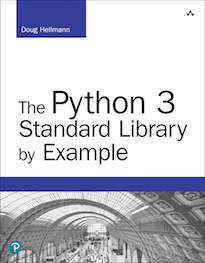Scheduling Calls to Regular Functions¶
In addition to managing coroutines and I/O callbacks, the
asyncio event loop can schedule calls to regular functions
based on the timer value kept in the loop.
Scheduling a Callback “Soon”¶
If the timing of the callback does not matter, call_soon() can be
used to schedule the call for the next iteration of the loop. Any
extra positional arguments after the function are passed to the
callback when it is invoked. To pass keyword arguments to the
callback, use partial() from the functools module.
import asyncio
import functools
def callback(arg, *, kwarg='default'):
print('callback invoked with {} and {}'.format(arg, kwarg))
async def main(loop):
print('registering callbacks')
loop.call_soon(callback, 1)
wrapped = functools.partial(callback, kwarg='not default')
loop.call_soon(wrapped, 2)
await asyncio.sleep(0.1)
event_loop = asyncio.get_event_loop()
try:
print('entering event loop')
event_loop.run_until_complete(main(event_loop))
finally:
print('closing event loop')
event_loop.close()
The callbacks are invoked in the order they are scheduled.
$ python3 asyncio_call_soon.py
entering event loop
registering callbacks
callback invoked with 1 and default
callback invoked with 2 and not default
closing event loop
Scheduling a Callback with a Delay¶
To postpone a callback until some time in the future, use
call_later(). The first argument is the delay in seconds and the
second argument is the callback.
import asyncio
def callback(n):
print('callback {} invoked'.format(n))
async def main(loop):
print('registering callbacks')
loop.call_later(0.2, callback, 1)
loop.call_later(0.1, callback, 2)
loop.call_soon(callback, 3)
await asyncio.sleep(0.4)
event_loop = asyncio.get_event_loop()
try:
print('entering event loop')
event_loop.run_until_complete(main(event_loop))
finally:
print('closing event loop')
event_loop.close()
In this example, the same callback function is scheduled for several
different times with different arguments. The final instance, using
call_soon(), results in the callback being invoked with the
argument 3 before any of the time-scheduled instances, showing
that “soon” usually implies a minimal delay.
$ python3 asyncio_call_later.py
entering event loop
registering callbacks
callback 3 invoked
callback 2 invoked
callback 1 invoked
closing event loop
Scheduling a Callback for a Specific Time¶
It is also possible to schedule a call to occur at a specific
time. The loop uses a monotonic clock, rather than a wall-clock time,
to ensure that the value of “now” never regresses. To choose a time
for a scheduled callback it is necessary to start from the internal
state of that clock using the loop’s time() method.
import asyncio
import time
def callback(n, loop):
print('callback {} invoked at {}'.format(n, loop.time()))
async def main(loop):
now = loop.time()
print('clock time: {}'.format(time.time()))
print('loop time: {}'.format(now))
print('registering callbacks')
loop.call_at(now + 0.2, callback, 1, loop)
loop.call_at(now + 0.1, callback, 2, loop)
loop.call_soon(callback, 3, loop)
await asyncio.sleep(1)
event_loop = asyncio.get_event_loop()
try:
print('entering event loop')
event_loop.run_until_complete(main(event_loop))
finally:
print('closing event loop')
event_loop.close()
Note that the time according to the loop does not match the value
returned by time.time().
$ python3 asyncio_call_at.py
entering event loop
clock time: 1521404411.833459
loop time: 715855.398664185
registering callbacks
callback 3 invoked at 715855.398744743
callback 2 invoked at 715855.503897727
callback 1 invoked at 715855.601119414
closing event loop
 PyMOTW-3
PyMOTW-3